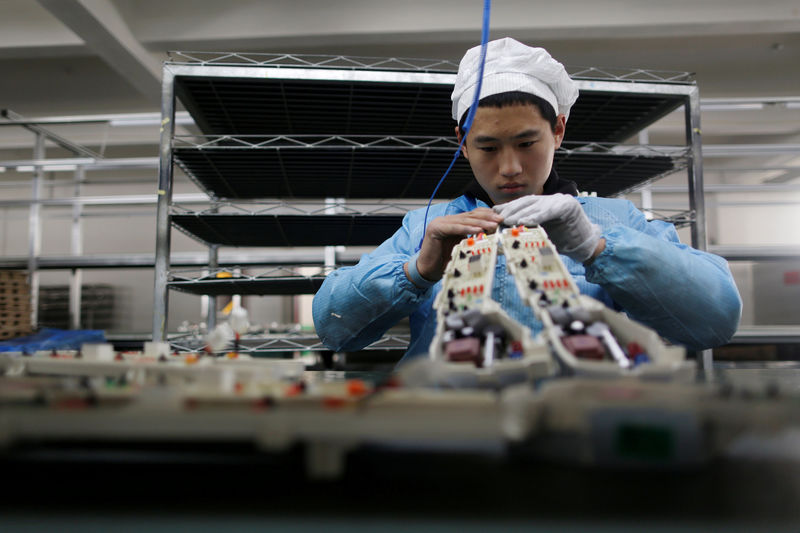BEIJING (Reuters) - Growth in China's manufacturing sector unexpectedly picked up to a six-month high in February as factories rushed to replenish inventories to meet rising new orders, a private survey showed on Thursday.
The findings were largely at odds with a downbeat official factory activity reading on Wednesday, which raised concerns of a sharper-than-expected slowdown in the world's second biggest economy this year.
But both surveys showed a marked strengthening in business confidence for the next 12 months, suggesting many Chinese companies see any softening in conditions as temporary, likely due to disruptions caused by the week-long Lunar New Year holidays last month.
The Caixin/Markit Manufacturing Purchasing Manager's Index (PMI) edged up to 51.6 last month, from 51.5 in January, and countering economists' expectations for a slight dip to 51.3. The 50-mark divides expansion from contraction on a monthly basis.
The Caixin survey focuses more on small and mid-sized companies, and possibly more export-oriented firms, than the larger official version.
But regardless of size, many factories and offices start to scale back operations ahead of time before shutting for the entire holiday or longer, while some manufacturers front-load shipments or replenish inventories ahead of the break.
That often leaves investors without a clear picture of China's economic health until March.
Economists have largest forecast GDP growth will moderate to 6.5 percent this year from a forecast-beating 6.9 percent in 2017, dragged by a cooling property market and a crackdown on riskier financing that is slowly pushing up borrowing costs.
The government is expected to announce next week a growth target of around 6.5 percent, the same as last year.
BUILDING UP STOCKS, BUILDING UP ENTHUSIASM
While both the private and official surveys showed factory output cooled in February, the loss of momentum was much more modest for companies surveyed in the Caixin report.
The Caixin PMI also pointed to a pick-up in total new orders, which prompted firms to rebuild inventories of raw materials. Expectations of a further improvement in client demand helped push business sentiment to an 11-month high.
"The stocks of finished products and stocks of purchases indices showed increases in the range that indicates economic expansion, reflecting that companies were making active preparations to start work in March," Zhengsheng Zhong, Director of Macroeconomic Analysis at CEBM Group, said in a note accompanying the Caixin release.
Companies continued to face rising input prices, however, and shed staff at the fastest rate in three months to reduce costs.
China's vast industrial sector reported strong earnings growth last year thanks to a year-long construction boom and resurgent exports.
